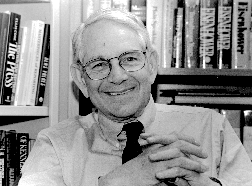|
|
Some Sterne wordsIPS news: A former "Sun" editor looks at the press's role in public policy
Christine A. Rowett |

Joseph Sterne started his career as a Baltimore reporter, traveled the world as a foreign correspondent and spent 25 years as an editorial page editor for this city's most prominent newspaper, The Sun. He now finds himself facing the challenges of a professional life in academia. Sterne, who recently joined the Institute for Policy Studies as a senior fellow, describes himself as a former "gung ho" reporter. Today, though, he is looking forward to spending time studying the fundamentals of the profession in which he thrived for 49 years.
 A senior fellow at the Institute for Policy Studies, Joseph Sterne draws on nearly 44 years of experience in various newsrooms of The Sun, where he was most recently editorial page editor. |
"When you're in the hectic business of journalism, you just worry about the news of the day; you're totally immersed in it," Sterne said. "This gives me the opportunity to kind of sit back and look at what I've been doing all of my life."
In the early 1960s, Sterne's professional life sent him to Africa for what he calls "an assignment of a lifetime." The continent was in the midst of a turbulent growth period that people around the globe did not understand.
"There was a lot of naivete among Americans--including me-- when we first got there," Sterne said. "So to see these societies flung into the 20th century, it was one long learning experience."
He spent several months there at a time, leaving his family here in Baltimore.
"It didn't make me popular back then," he admitted. "Young reporters today might agree to go for six weeks, but in those days you didn't do that. When the managing editor said, 'You're going to Africa,' you just took off and went to Africa. You followed the story."
After almost a decade in the Washington, D.C., bureau of The Sun and three years in Germany, Sterne returned to Baltimore, where he took the helm of The Sun's editorial page, forming the opinions of that newspaper for a quarter of a century. Though he worked with five publishers throughout the years, Sterne says he was never seriously confronted about his views, save for his idea about endorsing presidential candidates.
"For some reason, publishers like to get involved in endorsements," he recalled. The Sun had decided to endorse Richard Nixon in 1960 and 1968, but the editorial page editor at the time refused to write the endorsement, Sterne said. "They had to get somebody else from the staff who was somewhat more conservative to do it."
Sterne said he was bothered by the paper's apparent change of ideology; The Sun was known to be a middle-of-the-road publication, yet was placing its support behind a conservative candidate.
"It didn't seem to me to be in character with the paper," he said. "So rather than face the prospect of endorsing Reagan in '84, I talked the publisher into a policy of non-endorsements. I think it's very healthy."
As chief of the opinion page, Sterne had plenty of occasions to clash with former Mayor and Gov. William Donald Schaefer, now a fellow fellow at IPS.
"He was a great politician because he knew that this city had to think better of itself," Sterne said. "He and I used to squabble, but I always respected him. He didn't believe it, but I did.
"He used to send me letters. Great, angry letters," Sterne added. "The best one he sent just said, 'Sterne, you stink.' I treasure it."
Schaefer needn't rely on the U.S. Postal Service these days. His office at IPS is right next to Sterne's.
Though he is several years and offices away from today's gung-ho reporters, Sterne maintains a respect for the profession of gathering the news.
"The nature of reporting has changed," he said. "I think reporters today dig deeper. They're more sophisticated."
But such immersion has its price, Sterne said. It may cause reporters to lose their objectivity, which creates suspicion of the press and raises questions of credibility.
"We live in a society where everything is discussed in everyday conversations," Sterne said. "And as society changes, the press is going to change. You're always going to have a market for intimate viewing, and you'll always have elements of the press reporting it."
Ethics in journalism is just one topic Sterne hopes to explore next semester in a one-credit course called The Press and Public Policy.
"Everybody tells me that teaching a new course is quite a challenge," Sterne said. "I like the idea of being under the gun again."
The proposed course will be somewhat similar, Sterne said, to those offered by Marvin Kalb at Harvard's Kennedy School of Government.
As a precursor to the proposed course, Sterne has coordinated a lecture series of the same name. The second installment of "The Press and Public Policy" will feature four former reporters turned press secretaries to four former Maryland governors.
Frank DeFilippo, Louis Panos, Robert Douglas and John Frece, former staff members for Govs. Marvin Mandel, Harry Hughes, Schaefer and Parris Glendening, will discuss "Both Sides of the Divide" on Wednesday, Dec. 10, from 3:30 to 5 p.m. in the Arellano Theater of Levering Hall on the Homewood campus. The four will explore the give-and-take relationship between public figures and the members of the press assigned to cover them and how the media influences public opinion.
The lecture, sponsored by IPS, is free and open.